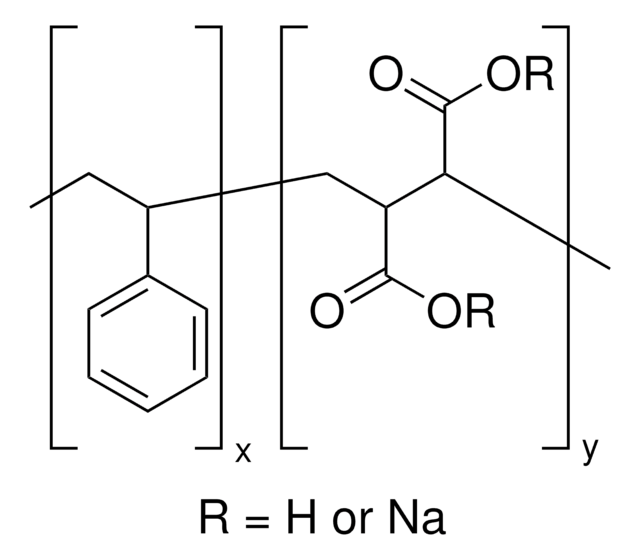L8920
Lipodisq®
Styrene:Maleic Anhydride Copolymer 2:1
Sign Into View Organizational & Contract Pricing
All Photos(1)
About This Item
UNSPSC Code:
12352202
NACRES:
NA.25
Recommended Products
biological source
synthetic
form
powder
storage temp.
room temp
Looking for similar products? Visit Product Comparison Guide
Application
Lipodisq® has been used in nanoparticle preparation along with palmitoyloleoylphosphatidylcholine (POPC) and palmitoyloleoyl phosphatidylglycerol (POPG).
Lipodisq® reagents are novel polymers derived from styrene and maleic acid. Lipodisq polymers are capable of forming nanosized lipid-based discoidal particles capable of incorporating membrane proteins. The Lipodisq technology can solubilize commonly used lipids such as dimyristoylphosphatidylcholine (DMPC) without the use of detergents. In general, Lipodisq polymers are potentially useful in mitigating the use of detergents for the solubilization of membrane proteins. Lipodisqs typically have a diameter of 9-10 nm at pH 7.4.
Biochem/physiol Actions
Lipodisq® is detergent-free and is useful in membrane protein biophysical studies including electron microscopy (EM), circular dichroism (CD), electron paramagnetic resonance (EPR) and nuclear magnetic resonance (NMR) techniques as well as delivery vehicle.
Legal Information
Lipodisq is a registered trademark of Malvern Cosmeceutics Limited
related product
Product No.
Description
Pricing
Storage Class Code
11 - Combustible Solids
WGK
WGK 3
Flash Point(F)
Not applicable
Flash Point(C)
Not applicable
Certificates of Analysis (COA)
Search for Certificates of Analysis (COA) by entering the products Lot/Batch Number. Lot and Batch Numbers can be found on a product’s label following the words ‘Lot’ or ‘Batch’.
Already Own This Product?
Find documentation for the products that you have recently purchased in the Document Library.
Juan Francisco Bada Juarez et al.
Biochimica et biophysica acta. Biomembranes, 1862(3), 183152-183152 (2019-12-18)
Dopamine receptors (DRs) are class A G-Protein Coupled Receptors (GPCRs) prevalent in the central nervous system (CNS). These receptors mediate physiological functions ranging from voluntary movement and reward recognition to hormonal regulation and hypertension. Drugs targeting dopaminergic neurotransmission have been
Juan Francisco Bada Juarez et al.
Chemistry and physics of lipids, 221, 167-175 (2019-04-04)
Nanoparticles assembled with poly(styrene-maleic acid) copolymers, identified in the literature as Lipodisq, SMALPs or Native Nanodisc, are routinely used as membrane mimetics to stabilise protein structures in their native conformation. To date, transmembrane proteins of varying complexity (up to 8
Our team of scientists has experience in all areas of research including Life Science, Material Science, Chemical Synthesis, Chromatography, Analytical and many others.
Contact Technical Service






